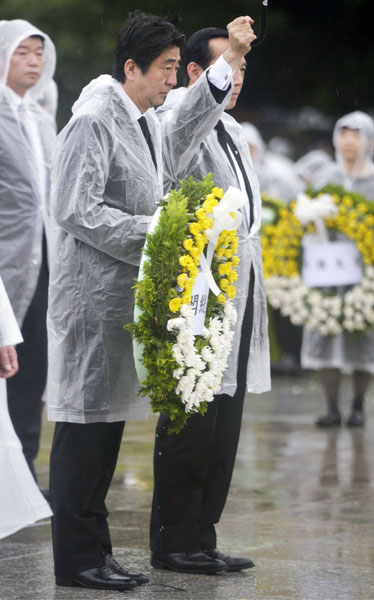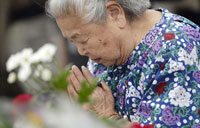 |
|
Japan's Prime Minister Shinzo Abe offers a flower wreath for the victims of the 1945 atomic bombing during a ceremony to mark the 69th anniversary of the world's first atomic bombing, at Peace Memorial Park in Hiroshima, in this photo taken by Kyodo August 6, 2014. [Photo/Agencies] |
|
 |
| Japan commemorates 69th anniversary of atomic bombing? |
Abe attended the ceremony and made an address before about 45, 000 participants, including survivors of the attack, their descendants, peace activists and officials such as US Ambassador to Japan Caroline Kennedy, saying Japan will uphold the three non- nuclear principles.
After the ceremony, a group formed by victims of the atomic bombing expressed to Abe their hope that the government could retract the cabinet decision on lifting the ban on exercising collective self-defense right but get negative answer from the prime minister, who said that the collective defense aims to protect Japanese people's peaceful life.
The protesters, shouting "get out of Hiroshima, Abe" or "we strongly oppose war and collective self-defense right," said that tragedy of Hiroshima and Nagasaki should not be replayed as the collective defense right would drag Japan into war again after nearly seven decades.
Japan's war-renouncing constitution bans Japan from using force outside Japan but Abe, through reinterpreting the constitution, gave green light to the SDF to exercise the collective defense, which allows SDF to fight overseas.
"Abe wants to follow the military road in the past through exercising the collective self-defense," a protester, who identified himself as Sakaki, told Xinhua, adding "self-defense is trigger of all wars."
Another protester, Yoshinaga, said that "lifting the ban on collective defense will lead to a replay of Hiroshima's tragedy and it is Abe himself who leads Japan onto a wrong way. It is unforgivable."
A latest nationwide poll by Japan's Kyodo News said that 84.1 percent of respondents believe the government has yet to provide a sufficient explanation regarding the cabinet's decision, while 60. 2 percent of respondents said they oppose exercising the right to collective self-defense.
Hiroshima Mayor Kazumi Matsui said during the ceremony that the Japanese government should realize that the country has avoided war for 69 years due to the war-renouncing constitution, adding " we must continue as a nation of peace in both word and deed," referring to the controversial collective self-defense.
